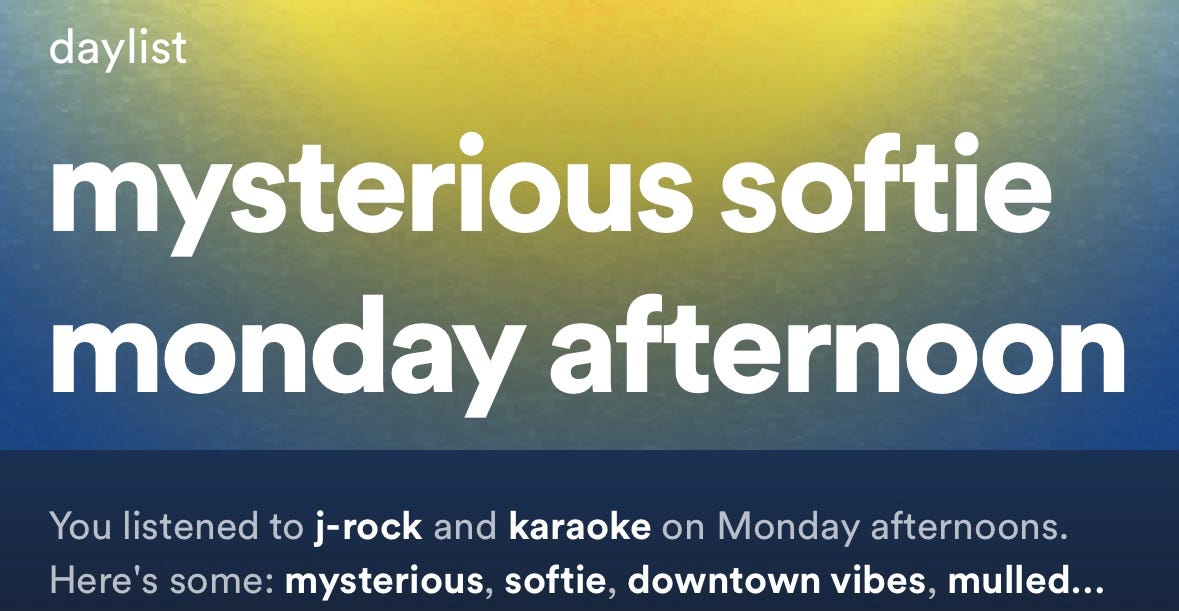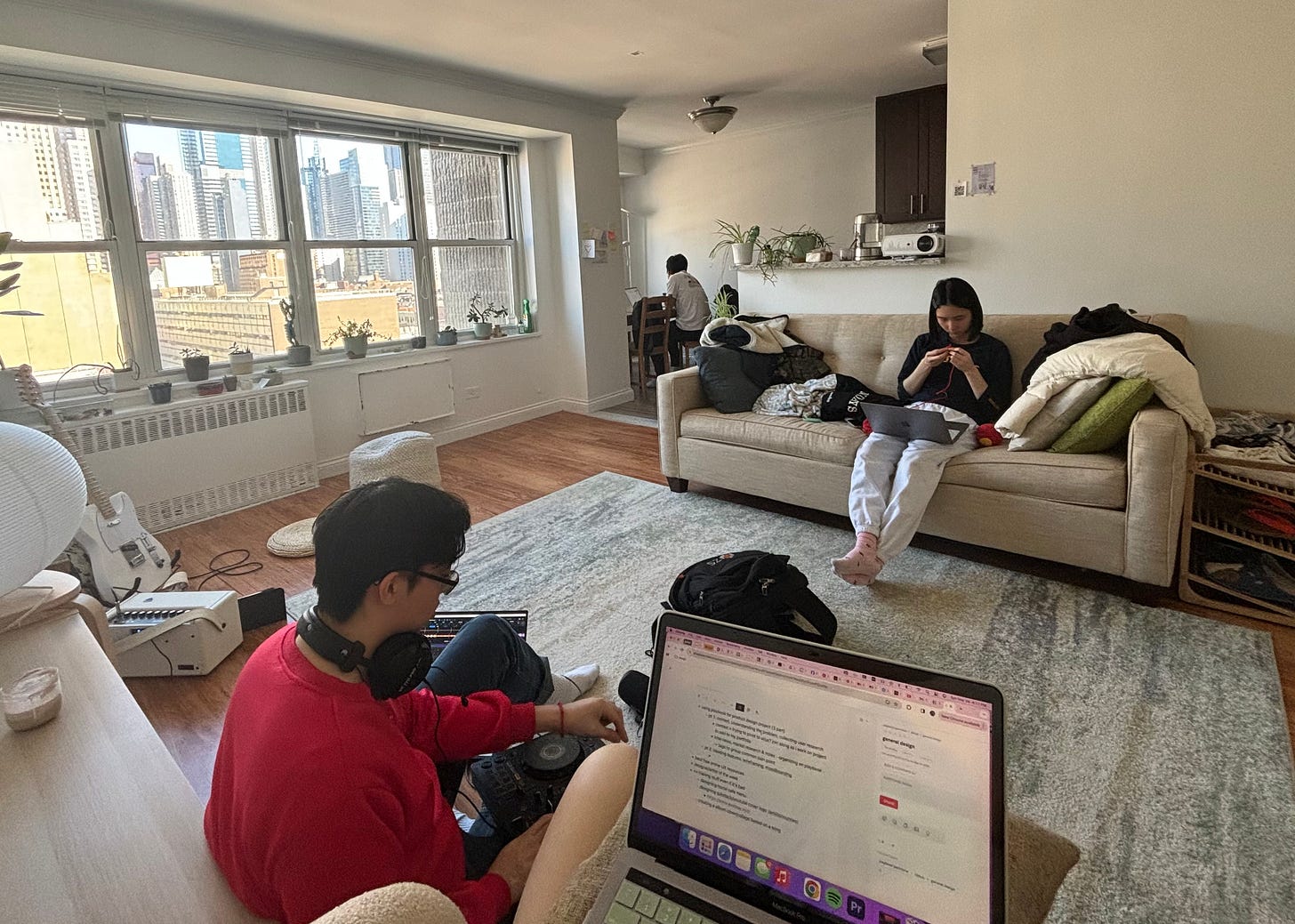It seems that in every getting-to-know-you phase of people discovery in the modern day, personality types are almost guaranteed to be a topic of discussion, the most common framework being myers briggs, and the most obvious pair of distinction being introversion vs extroversion. To that I ask two questions: 1) what does it mean to be perceived as 4 letters? and 2) what about the in-betweens?
Over the weekend, I was getting dinner with some close friends and I mentioned that there was an event later that night I was thinking about going to, but uncertain if I would because it was late, and I wouldn’t know many people at the event. In response, L prophesied “No, I’m sure you will go. At 10:30 I’m going to check find my friends and see you at the event”, with the reason being “you are an extrovert”, which I disagreed with. I then spent the next five minutes defending my introversion to this table of introverted friends, and we eventually accepted that perhaps there is a category of introverts demonstrating performative extroversion which is missing from the basic distinction and to which I would relate with.
I ended up proving L right and going to the event, and it got me thinking that sometimes my friends know me better than I know myself and also that it’s surprising how fast you can traverse the spectrum of extroversion, because three years ago no one would have challenged me if I declared myself an introvert.
what is performative extroversion?
The extroversion spectrum is one of the few that does actually have a term for being “in-between”: ambivert. Some people say that extroversion is the more valued trait in the pair, but I think the real winner is ambiversion - knowing how to adapt and being happy both when alone and with others. I’d define performative extroversion as one step before ambiversion, a necessary phase for introverts on the path to being more valued in society :’) but not always comfortably extroverted when need be.
Another way to put it is: performative extroversion is when self-identifying introverts exhibit behaviors associated with extroversion for the purpose of making new friends and making the most of social settings. Performative extroverts deliberately expend energy to project extroversion as a sort of strategic investment in their personal and professional development, and this demands conscious effort and intentionality. However, a prerequisite is the enduring need for and love of solitude. While they may find fulfillment in social interactions, performative extroverts recharge only by resting alone.
How do you know if you are a performative extrovert? Some signs may be:
you choose to go to parties but gravitate towards the corners of the room when you’re there
people say you’re a good conversationalist but you don’t like to initiate conversations
even when you have nothing really to say, you feel a need to fill a void when there’s a potentially awkward pause
you engage and react dramatically to everything so that others feel heard, but then often feel drained after
when does performance become real?
Admittedly, there is no definitive lining between when a behavior is performative and when it’s truly a part of you. It follows the same rules of repetition as faking it till you make it, and manifesting something until it becomes reality. These are socially prescribed acts that tell you how to make more friends so you learn to initiate and follow through (aka shoot your shot); you put yourself out there and before you know it you come to actually like meeting new people and that sense of belonging in a community.
I think that my social life has transformed quite a bit in the past few years, the biggest difference being that it has expanded drastically. I went from being the model room rat (term coined by friends in college when we resided in rooms rather than homes so therefore unqualified for the term homebody) who had the most irrational fear of being publicly ousted at any social gatherings to being someone who initiates hangouts without a second thought, who occasionally talks to strangers at cafes or bars, who hosts things every month.
the relationships between extroversion and quantity and quality of friendships
My social circle expansion was intentional, and the benefits include: meeting people who share specific niche interests or thoughts, usually having a handful of friends who are down to hangout at any point should I ask, but also receiving more frequent invites to things so less proactivity generally required to organize hangouts. However, there are also a few side effects which are worth noting.
As increased extroversion roughly correlates with increased quantity of friends, this also means that most likely, the average depth of connection a super extroverted person has with their friends is much more shallow than the average depth of connection an introverted person has with theirs. It’s a lot easier to maintain close relationships with 5 people than 30, even if all 30 are people you really like and want to be close with. It kind of sucks to have to schedule hangouts weeks in advance or feel like you are optimizing social activities based on convenience.
A few days ago, I made fun of my sister for her 6 month “suspicion period”, which she describes as the trial phase of friendship when potentials must prove they are worthy of her trust. Compared to my 1 good conversation and light social media background check suspicion period, 6 months seemed a bit much. But I realized the difference is in our capacity for maintaining outer-rim friendships - those people who you might describe as “a friend” but probably not ask them to help water your plants when you’re on vacation. For my sister, there is no such thing or need for outer-rim friends, and that’s why you’re either a close friend who passed the suspicion period or just an acquaintance.
Everyone has different standards for friendship and there will always be cases of expectation mismatch. As good as you get at making friends and exhibiting extroversion, there will probably still be cases where you feel like a loner (and that’s okay! also necessary to #stayhumble). And as much as your social circle might grow, eventually, you’ll have to get comfy setting boundaries. If your extroversion is truly performative, you’ll need that precious alone time. In those moments, here are a few different ways to gently tell others that your introverted self is introverting:
“i can’t, i made plans with myself”
“can i get back to you after i’m done hibernating?”
“i need to do nothing for a week or two”
“sorry for being mia, i was in timeout”
More ounces:
i actually love analyzing personality tests even if they have questionable legitimacy (what matters is you know they’re questionable). mbti has become common but here are some other fun ones… if you take them send me ur results :)
recent read: bliss montage by ling ma (thanks A for the rec)
i was enthralled by every story. imagine a male character that only talks in $$$ or overdosing on a drug that makes you invisible or an office hours that hides the gateway to a timeless portal. i loved how weird and strange yet mundane and matter-of-fact ling’s writing is. this was very digestable but the type of book that leaves you wondering because sometimes it’s not obvious what the stories really mean and often the endings are abrupt - that’s what made it very interesting to read.
lastly, a song i’ve been liking:






i also read bliss montage! what's ur good reads
also very real !!! I feel like I've met a lot of people in nyc but as a result my friendships are super inconsistent / feel shallow sometimes (ie people only see me in one context for a specific activity) but also I feel like I'm really diving into my interests and learning about the world which is cool
+ feel u on the idk how to carve time for myself / vet people / feel lonely sometimes despite knowing sm people
oz if u like analyzing personality type, maybe it would be fun to deep dive more in mbti! it is far more than just 4 letters, they're a code for the 8 cognitive functions, a more nuanced breakdown of a person's perception & decision making. in it, social extroversion is defined differently from cognitive extroversion. it is pretty interesting!